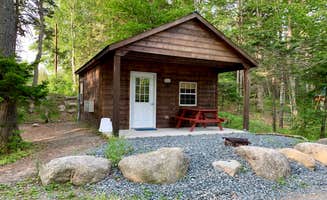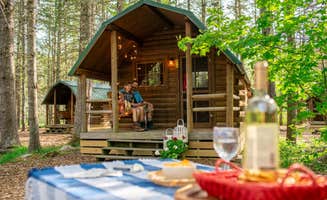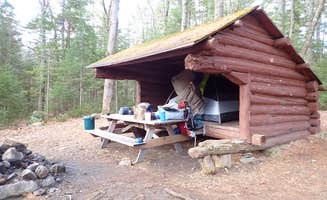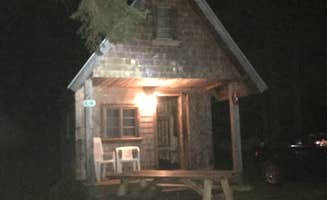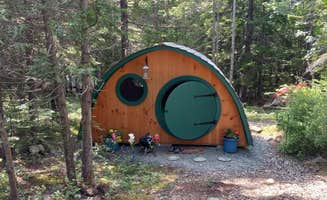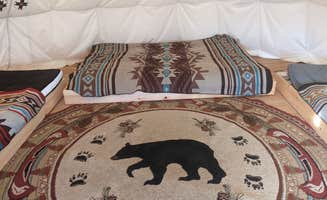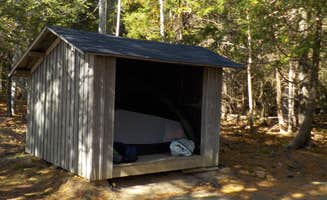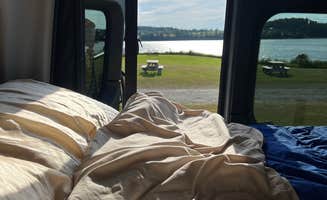Milbridge is situated on Maine's Downeast coastline where the Narraguagus River meets the Atlantic, with elevations ranging from sea level to 200 feet. The area experiences moderate summer temperatures averaging 75°F during peak camping season, with cooler evenings dropping to around 55°F. Local campgrounds typically remain open from mid-May through mid-October, with September offering fewer crowds but continued access to most amenities.
What to do
Kayaking from waterfront sites: At Lamoine State Park Campground, campers can launch directly from the water-adjacent campsites. "I stayed several nights here with my dog, in a gorgeous site right by the water. Fellow campers were friendly and it was nice and quiet. Great location - a short drive to Acadia without the crowds," reports one visitor. The park provides direct bay access for paddling with minimal boat traffic.
Tide pool exploration: Low tide at Seawall Campground reveals extensive tide pools perfect for discovering marine life. "With coastal hikes so close, sunrise hikes and exploring the tide pools were outstanding!" shares a camper. The dramatic tides can drop up to 24 feet, creating unique opportunities for shoreline exploration.
Stargazing after dark: Clear nights offer exceptional celestial viewing opportunities away from urban light pollution. "For stargazers, the short walk across the street to the beach will give you some unbelievable views of the milky way when the night is at peak darkness," notes one visitor to Seawall Campground. The Downeast region's dark skies make constellation identification possible even without specialized equipment.
What campers like
Ranger-led activities: State parks often schedule educational programs throughout the summer season. At Cobscook Bay State Park, campers appreciate the organized events: "They also had lovely ranger led activities that seemed like a great selling point as well." These programs typically cover local ecology and wildlife identification.
Free shuttle transportation: The Island Explorer bus system connects many area campgrounds to popular destinations. "The Island Explorer bus for Acadia National Park stops at the campground, so you have easy access without driving, if desired," mentions a visitor at Bar Harbor/Oceanside KOA. The shuttle runs approximately every 30 minutes during peak season.
Wildlife viewing opportunities: The coastal setting provides excellent wildlife spotting possibilities. "There is a lot of wildlife and waterlife - we saw many seals and cormorants in the water, as well as a few eagles," reports a camper at Cobscook Bay State Park Campground. Morning hours typically offer the best viewing conditions, particularly along shoreline areas.
What you should know
Shower availability varies: Some campgrounds have limited or no shower facilities. "There are restrooms in the campground, but no shower houses. The shower house is located in a separate facility about a mile from the campground entrance," explains a visitor to Seawall Campground. When available, showers may require quarters ($0.25-$1.50) for operation.
Cell service limitations: Remote locations often have spotty connectivity. "We didn't have reliable cell service. The shuttle bus takes 50 minutes to get to Bar Harbor, by car it's closer to 30," notes a Seawall Campground visitor. Coverage tends to be better at campgrounds closer to larger towns.
Reservation systems differ: Some parks operate on first-come, first-served basis while others require advance booking. "The campground does not take reservations so you can pick whatever open site you want and if you want to extend your stay, you can," reports a visitor to Bar Harbor Campground. Reservable sites typically book 2-3 months in advance during peak season.
Tips for camping with families
Playground access: Several campgrounds offer designated play areas for children. At Lamoine State Park, families note: "There is a playground on the way to the ocean view!" These areas provide convenient recreation options without leaving the campground property.
Swimming options: Pool facilities can be an important amenity for families. "They are all really nice and Acadia is great! There is a really nice large swimming pool perched right along the water, nice little nature trails/dog walking areas, laundry, game room, shuffleboard, playground, water access, arcade, and more," shares a Bar Harbor Campground visitor describing the amenities.
Cabin alternatives to tenting: For families seeking glamping near Milbridge, Maine, structured accommodations offer convenience. "Our family of four (my Husband and I and our 2 boys) stayed in a camping cabin for 5 days at the end of June. The cabin contained a queen sized bed and a set of bunk beds. It also had a private bathroom with metered shower," reports a visitor at Hadley's Point Campground. These units typically cost $85-125 per night.
Tips from RVers
Site selection strategy: Not all sites accommodate larger vehicles equally. "The roads in the park are paved but some corners can be a little tight for big-rigs, best to unhitch your tow car up front in case you have to back up," advises a Bar Harbor Campground reviewer. Calling ahead about specific site dimensions helps ensure proper fit.
Leveling requirements: Many coastal campgrounds have uneven terrain. "Many sites are not flat and require significant leveling if in an rv," notes a camper at Lamoine State Park. Bringing additional leveling blocks is recommended for the region's sloped sites.
Water and hookup limitations: Full-service sites are less common in state parks. "There is no water/electric/power at any site. There are water stations around the park, as well as a bath house and dump station," explains a visitor to Cobscook Bay State Park. Private campgrounds generally offer more hookup options than state facilities.


